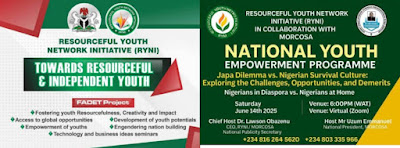Japa or Build ? Youths Across Continents Tackle Nigeria’s Survival Culture at National Youth Summit
By RYNI’s News Desk @DoublePrinceof RYNI
In a compelling and momentous virtual gathering that spanned continents, young Nigerians at home and abroad gathered for the RYNI-MORCOSA National Youth Empowerment Forum on June 14, 2025. Themed “Japa Dilemma vs Nigerian Survival Culture: Exploring the Challenges, Benefits and Opportunities,” the forum became a melting pot of hard truths, strategic thinking, and renewed hope.
Organised by the Resourceful Youths Network Initiative (RYNI) and the Mother of Redeemer Catholic Old Students’ Association (MORCOSA), the summit attracted participants from Nigeria, the UK, US, and Canada. The goal? To critically examine the “Japa” movement—Nigerians emigrating for better opportunities—and to explore whether staying back to build the nation is a realistic idea.
Dr. Lawson Obazenu, Executive Director of RYNI, delivered a stirring opening message. “This isn’t just another Japa debate. It’s a movement of minds. If we don’t build our nation, who will? Whether abroad or at home, we must lead boldly and act with vision.”
Echoing this call, Mr. Uzum Emmanuel, National President of MORCOSA, urged the youths to move beyond lamentation. “Our generation must go beyond complaints. We are gathered to offer practical solutions, forge partnerships, and rewrite Nigeria’s story.”
The programme featured dynamic panelists from Nigeria, the United Kingdom, United States, and Canada. Their insights painted a sobering picture of Nigeria’s current socio-economic terrain, while also revealing opportunities hidden in the nation’s turbulence.
Ambassador Ogagaoghene Ogheneyolega, Senior Special Assistant to the Delta State Government on Talent Development, provided a standout perspective: “There are real systemic problems in Nigeria, but I believe it is still possible—perhaps even easier—to make it here. For the focused and determined, the opportunities are massive. The youths must stop waiting for perfect conditions and start building from what we have.”
In contrast, diaspora voices highlighted the appeal of stability abroad. Dr. Uyilawa Okhuaihesuyi, U.S.-based orthopaedic surgeon and former NARD President, explained: “People are not just leaving for luxury—they’re leaving for safety, dignity, and a chance to breathe. If Nigeria provided an enabling environment, most would never leave.”
UK-based tech professional Emmanuel Onwuka offered a pragmatic view: “Abroad offers fairness. In Nigeria, sometimes who you know matters more than what you know. But either way, it’s not about glamour—it’s about survival and opportunity.”
Engineer Yahaya Moses, a senior lecturer at the Petroleum Training Institute, Delta State, delivered a spirited challenge: “I can only holiday abroad. Nigeria is home. And this is where I’m building. Let’s encourage our youths to aim for academic and professional excellence.”
Peter Pemu, a nurse practitioner in the U.S., agreed with the theme of survival: “Even abroad, it’s not rosy. But the systems work. People respect your hustle. You work and earn dignity. We need that structure in Nigeria.”
A defining moment came when Dr. Obazenu asked: “If given ₦15 million today, would you Japa or invest in Nigeria?” Surprisingly, some of the attendees chose Nigeria. From agritech ventures to educational innovation, ideas poured in. The common thread? If the environment improved, their loyalty would remain with home.
The summit’s live chat echoed the tension. One participant wrote: “Japa isn’t the goal. It’s our way of escaping a system that failed us.” Another added: “We don’t want to go. We just want a country that works.”
In his closing remarks, Mr. Uzum Emmanuel applauded the honesty and intensity of the dialogue. “This is what nation-building looks like—conversations like this, filled with truth, pain, and hope.”
Dr. Obazenu concluded with a stirring message: “We need partnerships. We need policy change. But more than that, we need vision. Youths—home and abroad—must lead the charge. Japa is not the enemy. A broken system is. And we must fix it—together.”
Plans are already in motion for a follow-up summit in July/August 2025 to co-create a youth-led National Action Agenda.
From Lagos to London, Abuja to Atlanta, the message was loud and clear: Nigeria’s future lies in the hands—and hearts—of its youth. Whether they stay or go, one truth remains:



Comments
Post a Comment